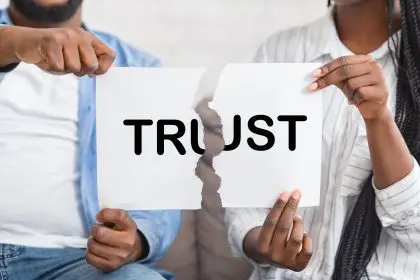Divorce marks the end of a chapter, not the end of your story. While the process often leaves emotional scars and lingering doubts, millions of people successfully rebuild their romantic lives and find deeper, more fulfilling relationships after navigating this difficult transition. The key lies in approaching this new phase with intention, self-awareness, and optimism.
The dating landscape you encounter post-divorce might look dramatically different than when you last participated, especially if your marriage spanned many years. Dating apps, changed social norms, and your own evolved priorities create both new challenges and exciting possibilities as you begin again.
For those ready to explore romantic connections after divorce, these seven strategies can help transform this intimidating transition into an opportunity for personal growth and renewed happiness.
Heal before you reveal: Timing your return to dating
The first and perhaps most crucial step involves honestly assessing your emotional readiness for new relationships. Diving back into dating while still processing grief, anger, or attachment to your former spouse often leads to disappointing outcomes.
Complete healing isn’t necessary—many divorced people carry some emotional wounds for years. However, reaching a state of genuine acceptance about your marriage’s end provides essential foundation for healthy new connections. This acceptance means no longer fantasizing about reconciliation, harboring active resentment, or defining yourself primarily through the failed relationship.
The timeline varies dramatically between individuals. Some people benefit from a substantial period of intentional singlehood, while others find that cautious dating helps facilitate their healing process. Mental health professionals often recommend waiting at least one year before pursuing serious relationships, allowing time to rediscover individual identity and process complex emotions.
Watch for key emotional indicators that signal readiness: feeling comfortable with your own company, no longer bringing up your ex in everyday conversations, and experiencing genuine curiosity about meeting new people rather than desperate need to avoid loneliness. These signs suggest you’ve created the emotional space necessary for authentic new connections.
Rediscover yourself before discovering someone new
Divorce often follows years of compromise and adaptation to another person’s preferences, sometimes to the point of losing touch with your authentic self. Before seeking new partners, reconnect with your individual identity and passions.
Explore activities you once loved but abandoned during your marriage. Experiment with new interests you never had freedom to pursue. This rediscovery process serves multiple purposes—it rebuilds your sense of self, creates natural opportunities to meet compatible people, and makes you more interesting to potential partners.
Take inventory of personal growth developed through your divorce experience. Many people emerge with enhanced emotional intelligence, clearer boundaries, and better communication skills. Recognize these strengths as valuable assets in future relationships rather than viewing your divorce as evidence of personal failure.
This period of self-rediscovery also provides opportunity to clarify what you truly desire in future relationships. Rather than reflexively seeking someone similar to your ex or their complete opposite, thoughtfully identify values and qualities most important to you now, based on hard-earned wisdom.
Create an authentic dating profile that attracts the right matches
For most divorced people, online dating platforms provide the primary avenue for meeting potential partners. Your profile serves as your introduction to countless possibilities, making authenticity and strategic presentation crucial.
Begin with recent, high-quality photos that accurately represent how you look today. Include images showing you engaged in activities you enjoy, providing natural conversation starters and attracting people with compatible interests. Avoid group shots where you’re difficult to identify, heavily filtered images, or photos that misrepresent your current appearance.
When writing your profile, focus on who you are now rather than detailing your past. Brief, positive acknowledgment of your divorced status suffices—”Divorced and embraced the growth that came with it”—without dwelling on previous relationship details better saved for in-person conversations.
Highlight your current passions, values, and lifestyle in specific rather than generic terms. Instead of saying you “enjoy outdoor activities,” mention your weekend hiking group or annual camping tradition. These specific details attract truly compatible matches while providing natural conversation starters.
Address the children question straightforwardly if you’re a parent. Your role as a parent represents a non-negotiable part of your life that potential partners need to understand from the beginning. A simple statement like “Proud parent of two amazing teens who live with me part-time” establishes this reality without overwhelming your profile.
Navigate the changed dating landscape with flexibility
The dating environment likely changed dramatically since you last participated, requiring adaptability and openness to new approaches. Understanding these shifts helps prevent frustration and disappointment as you reenter the dating world.
Dating apps now dominate the landscape, each with distinct cultures and expectations. Research different platforms to find environments aligned with your relationship goals. Some apps cater to serious relationship-seekers, while others primarily facilitate casual connections. Many now offer specialized communities for specific age groups, interests, or backgrounds.
Communication patterns have evolved, particularly in early dating stages. Text messaging often replaces phone calls, with varying expectations about response timing and engagement level. Dating app conversations may progress for days or weeks before in-person meetings, creating both opportunity for pre-screening and risk of building unrealistic expectations.
Social norms regarding who initiates contact, plans dates, or pays for outings have become more flexible. Rather than adhering to outdated rules, focus on clear communication about your preferences and comfort level while remaining open to different approaches.
The pace of modern dating often feels accelerated compared to previous experiences. Some people expect rapid progression in physical intimacy, relationship labeling, or exclusivity discussions. Prepare to communicate your boundaries clearly while accepting that your timeline may differ from others you meet.
Approach first dates with curiosity rather than pressure
First dates after divorce often trigger anxiety, especially if your marriage predated the current dating environment. Reframing these encounters reduces pressure and increases enjoyment of the process.
View early dates as opportunities for connection rather than high-stakes auditions for lifelong partnership. This mindset shift allows natural conversation flow without excessive self-consciousness or premature relationship expectations.
Choose comfortable, conversation-friendly environments for initial meetings. Coffee shops, casual lunch spots, or activity-based dates like gallery visits reduce pressure while providing natural conversation topics. Limit alcohol consumption to maintain clear judgment and authentic self-presentation.
Prepare thoughtful questions that reveal compatibility without resembling job interviews. Inquire about current passions, future aspirations, and values rather than focusing on relationship histories. Listen actively to responses, showing genuine interest in learning about your date beyond surface-level attractions.
Address your divorced status honestly but briefly when relevant, without extensive details about what went wrong. A simple acknowledgment with emphasis on lessons learned demonstrates self-awareness without dwelling in the past. Follow your date’s cues regarding how much they wish to discuss previous relationships.
Remember that awkward moments and imperfect connections represent normal parts of dating, not personal failings. Not every date will lead to a second meeting, regardless of how long you’ve been off the market. Approach these experiences as practice that builds confidence for when meaningful connections do emerge.
Build new relationships with boundaries and transparency
As connections develop beyond initial dates, intentional communication becomes essential for creating healthy relationship foundations. Divorced people often bring both wisdom and wounds to new partnerships, requiring thoughtful navigation.
Establish clear boundaries reflecting your current needs and values. These might involve privacy, communication styles, pace of physical intimacy, or integration with children and extended family. Communicating these boundaries early prevents misunderstandings and reveals compatibility with potential partners.
Practice transparency about your life circumstances without oversharing traumatic divorce details. Discuss practical realities like co-parenting arrangements, financial obligations, or ongoing legal matters that might affect a new relationship. This honesty allows potential partners to make informed decisions about their own readiness for your situation.
Watch for relationship patterns you’re unconsciously repeating from your marriage. Many divorced people initially gravitate toward familiar dynamics, even unhealthy ones, because they feel comfortable. Awareness of these tendencies allows intentional choices toward healthier patterns.
Expect occasional emotional triggers as new relationships progress. Certain situations, anniversaries, or conflicts might unexpectedly resurface divorce-related feelings. When this happens, distinguish between past wounds and present circumstances to avoid projecting old relationship dynamics onto new partners.
Integrate new relationships thoughtfully with existing responsibilities
For many divorced people, especially parents, building new relationships involves navigating complex existing commitments and relationships. Thoughtful integration increases success potential while protecting important priorities.
Introduce new partners to children gradually and age-appropriately. Younger children need simple explanations and reassurance about the adults in their lives, while teenagers benefit from respectful acknowledgment of their feelings and appropriate privacy boundaries. Regardless of age, children need time to adjust to changing family dynamics.
Coordinate with co-parents respectfully when dating becomes serious. While detailed discussions about your dating life rarely prove necessary, informing your former spouse before children meet significant new partners demonstrates respect for their parental role and reduces potential conflicts.
Balance attention between romantic relationships and children’s needs. Quality relationships enhance rather than compete with family life, but establishing this balance requires intentional time management and clear communication with all involved.
Navigate extended family dynamics with patience. Parents, siblings, and in-laws might express opinions about your dating choices, especially when children are involved. Setting respectful boundaries while acknowledging their care for your wellbeing helps manage these complex relationships.
Consider legal and financial implications before fully merging lives with new partners. Previous divorce settlements might contain provisions affecting housing decisions, financial arrangements, or geographic limitations. Understanding these factors early prevents complications in developing relationships.
Embrace the journey with patience and optimism
Finding fulfilling love after divorce rarely follows a linear or predictable timeline. Approaching the process with realistic expectations and genuine openness creates the best foundation for eventual success.
Recognize that meaningful connections often emerge when least expected. While actively participating in dating increases your opportunities, maintaining full engagement with your broader life prevents unhealthy fixation on finding partnership. The richness you develop in your independent life ultimately makes you more attractive to compatible partners.
View unsuccessful dating experiences as valuable information rather than personal failures. Each interaction—even disappointing ones—provides clearer understanding of what you need and want in future relationships. This perspective transforms rejection from devastating setback to useful redirection.
Remain open to different relationship models than you’ve previously experienced. Your next meaningful connection might not resemble traditional marriage but could still provide profound companionship, growth, and joy. Many divorced people discover more authentic relationships by expanding their definition of partnership.
Trust your evolved instincts about compatibility and warning signs. The wisdom gained through divorce often includes more finely-tuned awareness of relationship dynamics. When internal alarms signal potential problems, take them seriously rather than dismissing them as unnecessary caution.
Remember that thousands of people successfully find deeper, more authentic love after divorce every year. These relationships often prove more satisfying precisely because they’re built on greater self-knowledge, clearer communication, and genuine choice rather than youthful idealism or societal expectations.
The path to finding love after divorce involves both challenges and remarkable opportunities for personal growth. By approaching this journey with self-awareness, patience, and optimism, you create the conditions for building relationships that reflect your authentic self and deepest values. The lessons learned through divorce, though painfully acquired, often lead to the most meaningful connections of all—partnerships chosen with wisdom, entered with clear eyes, and built on foundations of mutual respect and genuine compatibility.

















